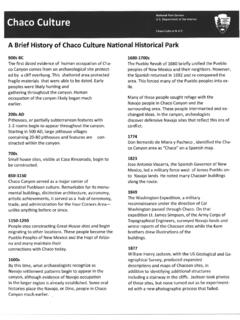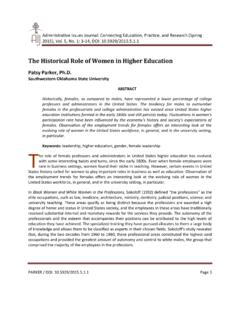Transcription of Historical Revisionism - Reformed
1 Historical Revisionism . by G. I. Williamson Historical Revisionism (also but less often in English called negationism ) is a phrase that de- scribes the process that attempts to rewrite history by minimizing, denying or simply ignoring essential facts. It is, in other words, a breaking of the ninth commandment as clearly illustrated in the following two examples. (1) During the rule of dictator Joseph Stalin in the Soviet Union, a variety of revisionist tactics were employed to ignore unpleasant events of the past. Soviet school books would constantly be revised to remove or alter photographs and articles that dealt with politicians who had fallen out of favor with the regime. History was frequently re-written, with past events modified so they always portrayed Stalin's government favorably. (2) In George Orwell's now famous book Nineteen Eighty-Four, the government of the main character's country (Oceania), which is nominally led by the enigmatic Big Brother, is constantly revising history to be in harmony with the current political situation.
2 For instance, if Oceania is at war with Eurasia, then the official position is that they have always been at war with Eurasia. If the situation changes, the civilians are brainwashed accordingly. In this novel, Historical revision- ism is one of the main policies of the propaganda arm ( Ministry of Truth ) of Oceania's gov- ernment. The main character, Winston Smith, is employed to revise newspaper articles and doctor photographs. This book was inspired from the real-life government policies in the Soviet Union (as indicated above.). It is bad enough when we encounter this in the civil sphere. It is even worse when we encounter it in the Christian Church. But it is far more prevalent than many seem to realize. How often have you heard the familiar phrase this is the way it's always been? Is this not what we often hear when a question is raised concerning such observances as Christmas, Good Friday' and Easter?
3 Here, as an example, is what one Consistory recently said in response to just such a question from members of their congregation. Historically, there have been two views with regard to special services. The Continental ap- proach ( Reformed and Lutheran) has had a more favorable attitude toward them. The Presbyte- rian approach (Puritans, etc.) has had a more negative attitude. Both of these traditions are advo- cates of the Regulative Principle for worship, yet they apply it slightly differently. 1. Isn't this just another example of this is the way it's always been? The problem with the Consis- tory's answer is that it does not adequately state the truth. Was John Calvin not Continental'? He cer- tainly was. But he was also in hearty agreement with his predecessor, William Farel, who had already banished all observances of special days other than the Lord's days in the Geneva church. And these early Reformers were not alone.
4 Two respected scholars of the Christian Reformed church Idzerd Van Dellen and Martin Monsma were honest enough to admit this when they wrote, in 1941, a much more accurate statement. They said: During the early days of the Reformation some Reformed localities observed only Sunday. All special days sanctioned and revered by Rome were set aside. Zwingli and Calvin both encouraged the rejection of all ecclesiastical festive days. In Geneva all special days were discontinued as soon as the Reformation took a firm hold in that city. Already before the arrival of Calvin in Ge- neva this had been accomplished under the leadership of Farel and Viret. But Calvin agreed heart- ily. And Knox, the Reformer of Scotland, shared these same convictions, he being a disciple of Calvin in Geneva. Consequently the Scottish Churches also banned the Roman sacred days. 1 I've refrained from naming the source of this statement because I don't want to single them out.
5 It is virtually identical with similar words of defense for the status quo that I have heard many times over the past half century. 1. Historical Revisionism . These eminent Reformers took this stand for the following reasons: The festival days are not or- dained of God but are a human invention; they minimize Sunday, the God-ordained weekly day of rest; they lead to paganistic celebrations and promote licentiousness. In view of present day cele- brations of days as Christmas and Easter by the general public and many believers it must be said that the contentions of the Reformers as to this last point were certainly correct. Present day cele- bration of these days is more pagan than Christian. Neither can it be denied that the observance of these days is but an invention of man, and that many people hold these festivals in higher esteem than Sunday. Considering the position of the Reformers, we are not surprised that the Synod of Dort, 1574, held that the weekly Sabbath alone should be observed, and that the observance of all other days should be discouraged.
6 This same Synod, however, also decided that the Ministers should preach about the birth of Christ on the Sunday preceding Christmas day, and Ministers were also permitted to preach on the resurrection of Jesus on Easter Sunday and on the outpouring of the Spirit on Pente- cost Sunday. The tweede feestdagen, , second festival days, still observed in Holland on De- cember 26 and on the days following Easter and Pentecost, were set aside and ignored completely by this Synod.. The inescapable question is therefore this: are these statements by Van Dellen and Monsma true? If they are it is a serious distortion of truth to say The Continental approach has had a more favorable attitude toward these days than these Presbyterians. It is also a distortion of the truth to say the Presby- terian approach (Puritans, etc.) has had a more negative attitude toward these days than did Continental Reformed unless the earlier period the first years of continental Reformed history is arbitrarily ex- cluded.
7 But if the above cited Historical facts are not excluded they indicate a very opposite conclusion. The earlier Continental Reformed people were just as negative toward these days as those awful Puri- tans' ever were. It is also a fact that the Heidelberg Catechism and Belgic Confession which were writ- ten and adopted in that early period by the Continental Churches are in full accord with the teaching of the Presbyterians on this subject. 2. The Historical record does indeed reveal an important difference. But the difference is not between Continental Reformed , on the one hand, and Presbyterian, on the other, but rather the difference between what our Fathers meant when they said all, any and only and what we today take those words to mean. In other words the truth is that neither the Continental Reformed nor the Presbyterians today really hold to the same rules as our Fathers did. The above-quoted Consistory said: Both of these traditions are advocates of the Regulative Principle for worship, yet they apply it slightly differently.
8 This sentence 2 The Heidelberg Catechism (Q/A 96) says we are not to worship God in any other way than he has commanded in his word. None of these special days such as Christmas are commanded. The Belgic Confession Art. VII says the whole manner of worship which God requires of us is written in them [the scriptures] therefore it is unlawful for any one, though an apostle to teach otherwise than we are now taught in the Holy Scriptures. Christmas, Good Friday and Easter are nowhere revealed as any part of Apostolic Church teaching or practice. This same article goes on to say: nor ought we to consider custom, or the great multitude, or antiquity, or succession of times as of equal value with the truth of God Therefore we reject with all our hearts whatsoever does not agree with this infallible rule which the apostles have taught us How can it be denied that our present day practice is in large measure a contradiction to this very clear warning?
9 Similarly Art. XXXII says rulers of the church ought studiously to take care that they do not depart from those things which Christ, our only Master, has instituted. And therefore we reject all human inventions, and all laws which man would introduce into the worship of God, thereby to bind and compel the conscience in any manner whatever. Van Dellen & Monsma were honest enough to admit that special days such as Christmas, Good Friday and Easter are mere human inventions. How, then, can anyone who favors these days claim to agree with the Belgic Confession? (I underline the words that most Reformed and Presbyterian Churches today do not seem to me to agree with). 2. Historical Revisionism . implies that there has always been a difference between Presbyterian and Reformed Churches concerning this matter, and that the difference is not important. But the facts of history both earlier history and later history indicate rather that (1) there was no significant difference at all to begin with, and (2) that the very real difference between the earlier and later practice in both traditions is very significant indeed.
10 Historical records show that earlier practice was modified much earlier in Continental Reformed churches than it was in Scottish Presbyterian churches. The First Book of Discipline, adopted by the Scot- tish Presbyterian Church (CofS) in 1560 said keeping of holy dayes all those that the papists have in- vented, [such] as the feasts of Chrismasse which things because in Gods Scriptures they neither have commandement nor assurance, we judge them utterly to be abolished from this realme. 3 And because there was no pressure at that time from civil authorities to compromise this conviction, the Christian Year ceased to be observed in the CofS for nearly 200 years 4 It was different with the Continental Re- formed Churches. They soon began to accommodate these feast days. Therefore, as Van Dellen and Mon- sma themselves asked, in the light of the earlier stand of these churches: How is this to be explained?





